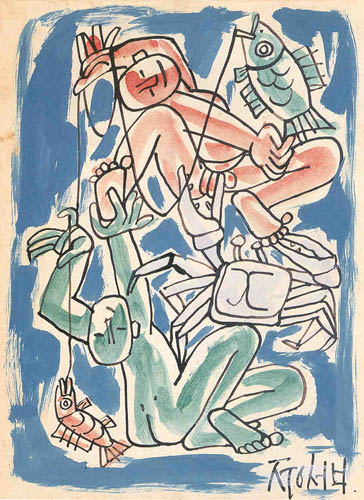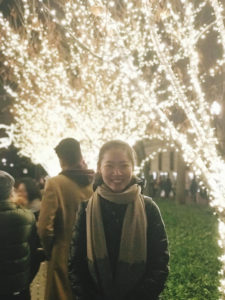Information for Prospective MA and PhD Students
Resources are categorized under the following tabbed sections.
- Applying to EALAC Graduate Programs
- Prospective MA Students
- Prospective PhD Students
Applying to EALAC Graduate Programs
The deadline to apply to the PhD program is December 9, 2021. The priority deadline for application to the East Asian Languages and Cultures MA Program is also December 9, 2021. Space permitting, MA applications will be accepted on a rolling basis until May 26, 2022.
All applications to EALAC graduate programs, both MA and PhD, are submitted through the Graduate School of Arts and Sciences online application system.
- For information about the admissions process, please see the admissions page of the Graduate School of Arts and Sciences (GSAS).
- For any questions about the application process, please first see the GSAS FAQ page.
- For specific information pertaining to international students, please see the GSAS international applicants page.
 Painting by Yi Chung-Sop
Painting by Yi Chung-Sop
Prospective MA Students
The Master of Arts program is a regionally-focused humanities program designed for students who wish to broaden their knowledge of East Asian studies and languages. The program equips students with the language skills necessary to prepare them to undertake advanced research at the PhD level in their region of choice. Alongside a regional or transregional comparative focus, students choose a discipline and take seminars as well methodological courses to prepare for conducting thesis research. For more information about the MA program, please refer to the EALAC MA Degree Requirements.
The MA program in Columbia’s Department of East Asian Languages and Cultures (EALAC) has a very strong record of placing its graduates in first-rate PhD programs around the country. Many of MA graduates also hold significant East Asia-related positions in law, foreign relations, business, journalism, museum or library work, and other fields. This program offers MA students exactly the same courses that are open to PhD students, assuming appropriate language capacities, and our students are free to take courses across the humanities and social sciences, tailoring their programs to their own needs.
Progression to Doctoral Study
Approximately half of our MA students proceed to doctoral study after the completion of their degrees, both at Columbia and other top universities. MA students wishing to matriculate as doctoral students at Columbia must reapply as such through the Graduate School of Arts and Sciences.
EALAC MA and MARSEA
The EALAC MA program differs from the MARSEA (Master of Arts in Regional Studies-East Asia) program in the Weatherhead East Asian Institute at Columbia University in that it focuses predominantly on history, humanities, and languages. This approach is manifested in EALAC’s many courses on history, literature, philosophy, religion, popular culture, film, visual culture, material culture and archaeology, and it does so in both the pre-modern and modern/contemporary periods. Applicants who are primarily interested in contemporary issues such as international politics, economy, and social sciences should apply to the MARSEA program.
Five-year Combined BA/MA Program
Students enrolled at Columbia College, SEAS, Barnard, and the School of General Studies may apply for early admission to the M.A. program in East Asian Languages and Cultures and begin their M.A. coursework in their senior year while completing their undergraduate degree. For more information, please see the BA/MA Option page.
Funding & Cost of Attendance
Please visit the GSAS tuition page for more information on cost of attendance.
While partial funding is available to select MA students in each incoming class, the majority of EALAC master’s students are self-funded, and we recommend that all potential students review their funding options as outlined by the Graduate School of Arts and Sciences.
EALAC offers a limited number of merit-based financial scholarships to MA students each year. All applicants to the EALAC MA program will be automatically considered for any available awards. Awardees will generally be notified of their receipt of a scholarship within one week of receiving their offer of admission. As there are a limited number of scholarships to award, students are encouraged to submit their applications as soon as possible to ensure full consideration.
AKS-CKR Fellowship for Korean Studies
The Academy of Korean Studies-Center for Korean Research Fellowship provides partial funding to MA students in the Department of East Asian Languages and Cultures (and other programs) with a Korea-related focus.
Duration of Study
Typically, students complete their program of study in 3-4 semesters. Most students choose to take advantage of an extended period of study, especially because the tuition drops significantly in the second year of enrollment. Please see potential models of study under MA requirements.
Advising
The MA Director serves as general advisors for all MA students, and is available to advise students in addition to their advisors and the Director of Graduate Studies. However, students are expected to work closely with their faculty advisor—assigned during the admission process— in shaping their course of study and formulation of their thesis. Students are encouraged to take courses outside of their field, regional focus, and also outside of the EALAC department. Our department’s graduate level seminars and colloquium allow MA student enrollment.
Courses
Students are encouraged to take courses outside of their field and regional focus. Our department’s graduate-level seminars and colloquia allow MA student enrollment.
While the department does not place restrictions on MA students’ course enrollments, some courses are offered only by permission of a given program or instructor. Many students take advantage of courses at Teachers College, the School of International and Public Affairs (SIPA), and the Columbia Law School.
Potential Career Options
While many graduates of the MA program choose to pursue a PhD, other students continue on into careers in the Foreign Service, museums and foundations, as well as higher education or business.
Prospective PhD Students
EALAC has long been known for its distinguished faculty and for its many PhD alumni, who teach in numerous universities and colleges around the United States, Europe, and Asia. EALAC is one of the only programs in the world to have deep strength in China, Korea, Japan, and Tibet in both modern and premodern periods, across a wide spread of disciplines, ranging from history, religion, and literature to visual culture and film. The PhD program in the Department of East Asian Languages and Cultures is also closely affiliated with the Department of History, under a joint degree program called History-East Asia. For more specific details, please see specific “Fields” under “Graduate Programs.”
Application Process
All students interested in applying must do so through the Graduate School of Arts and Sciences online application system.
In order to guarantee that your application will be considered for financial aid, your complete set of materials must be submitted by December 9, 2021. All admitted students will matriculate in the following Fall term; there are no Spring admissions.
Applicants are strongly encouraged to contact faculty members in the department whom they are interested in studying with so as to discuss their potential research plans, and to gauge their fit with the aims of the program. Applicants are advised to read information on the “Fields” page and the “Faculty Profiles.”
GRE scores are recommended, but not required.
TOEFL or IELTS are required for students who receive their undergraduate degree from an institution at which the primary language of instruction is not English. For more information, see the standardized tests section of the GSAS FAQ page.
Writing samples should be approximately 15 pages in length and composed in English.
Duration of Study
PhD students are expected to complete their study in the program within seven years. Students who do not enter the program with an MA, or hold an MA in a field other than that in which they are pursuing the PhD are required to complete a MA, generally within the first one or two years of study. Most candidates take their oral examination and defend their dissertation proposal, earning an MPhil in the third year of study. For more detailed information, please see the EALAC PhD Degree Requirements.
Funding
Students who are offered admissions into the PhD program receive five years of full funding (covering tuition, stipend, and fees) from the Graduate School of Arts and Sciences. Additional support may be provided depending on the circumstances. For more information, please see the GSAS external funding policies.
Housing
Because housing is extremely limited, students who accept offers of admission should immediately apply for housing. To do so, please visit the GSAS doctoral student housing page.
Visa Questions
Visa questions should be directed to the International Students & Scholars Office (ISSO).







